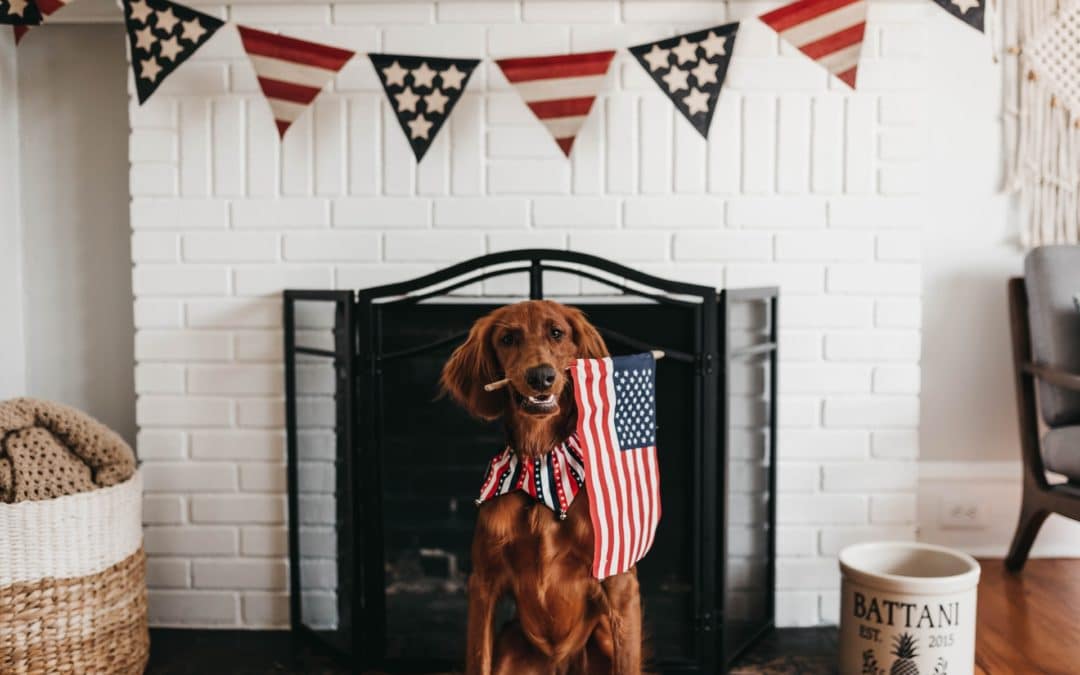Celebrating the Fourth of July with fireworks and parties is a fun tradition for many families. But, if you have four-legged family members at home, it’s important to keep in mind that their idea of fun does not include sudden, frightening noises.
Fireworks bring on severe anxiety in many dogs with their loud bangs, bright flashes, and strong smells. Luckily, the team at Anasazi Animal Clinic is here to teach you about the signs of anxiety in dogs and how to soothe your pooch. Here’s some advice on celebrating a happy Fourth of July with your furry friends.
Signs That Your Dog Is Scared of Fireworks
Your dog can’t always tell you when they’re afraid, and sometimes people mistake their pet’s anxiety symptoms for bad behavior. If your pup is showing any of these symptoms during a fireworks celebration, they are most likely anxious, not disobedient.
- Shaking
- Hiding
- Whining
- Pacing
- Panting
- Destructive behavior
- Accidents
- Excessive barking
Concerned dog parents often try to medicate their pets to calm them down, but there are better ways to ease your dog’s fireworks anxiety during the fourth of July.
Six Tips to Help Your Dog with Fireworks Anxiety
1. Practice Sound Training
If this is your puppy’s first Fourth of July, they may be afraid of fireworks because the noise is unfamiliar. Try playing fireworks sounds for your dog a few weeks in advance so they get used to hearing the noise. You can even pair the noises with their favorite treat.
2. Go for an Early Walk
Getting out for a walk earlier in the day makes it less likely that you and your dog will encounter fireworks while you’re out of the house. Plus, a tired pup is less likely to react to late-night fireworks, so a long day of play and exercise may help them sleep through the night. Early potty breaks also decrease the likelihood that your dog will have an accident if they get scared.
3. Use an Anxiety Vest
An anxiety vest swaddles your dog while applying gentle pressure on their torso, and makes them feel safe and secure. Make sure you get your dog accustomed to their vest before July 4th, so they are comfortable in it and feel safe when the fireworks begin.
4. Create a Safe Space
Naturally, dogs are den animals. Creating a quiet, comfy cave for them away from the chaos can help them feel safe. Put their bed or crate in a room or closet away from the action and play white noise or calming music to block out the sound of fireworks.
5. Be There for Your Dog
You are your dog’s source of security. Petting them and speaking in soft, calm tones will help reassure them that they are safe. Play together with some of your dog’s favorite toys, or fill a busy toy with treats to keep them occupied.
6. Talk to Your Vet
Fireworks anxiety is common in dogs, but if your pet’s fear might put you or your pet in danger, it is important to talk to a professional. A veterinarian can teach you more about what you can do to keep your pet and yourself safe during storms, fireworks, and other events that can trigger noise aversion.
Fourth of July Pet Safety
The July 4th weekend is the most common time of the year for pets to go missing. With lots of people coming in and out of the house for barbecues, combined with the loud, panic-inducing noise of fireworks, many pets run away.
One precaution you can take to prevent losing your pet is microchipping. The information stored in the microchip can help anyone who finds your dog get in touch with you, even if your dog loses their collar and ID tags.
The best way to keep your pets safe during the festivities is to make sure you know where they are at all times. Keep them contained in a separate part of the house, or leash them where you can keep an eye on them.
If your dog does get lost, it’s important to act quickly. Bring your dog’s favorite toy and some treats along with you when you look for them, as well as an extra collar and leash. After canvassing your neighborhood, call local shelters and check social media sites like Nextdoor or Pawboost for “found pet” notices.
Veterinary Care in Gilbert
It is not uncommon for dogs and other pets to be frightened by the light, noise, and smell of fireworks. However, consistent behavioral changes after loud sounds could mean that your dog suffers from noise aversion, a treatable condition that affects nearly 67% of dogs in the United States.
For more advice on how to help your dog with fireworks anxiety, or to learn more about noise aversion, contact our compassionate team at Anasazi Animal Clinic. Call 480-497-0505 or send us a message so you and your pet can enjoy the Fourth of July together!
Photo by Camylla Battani on Unsplash

